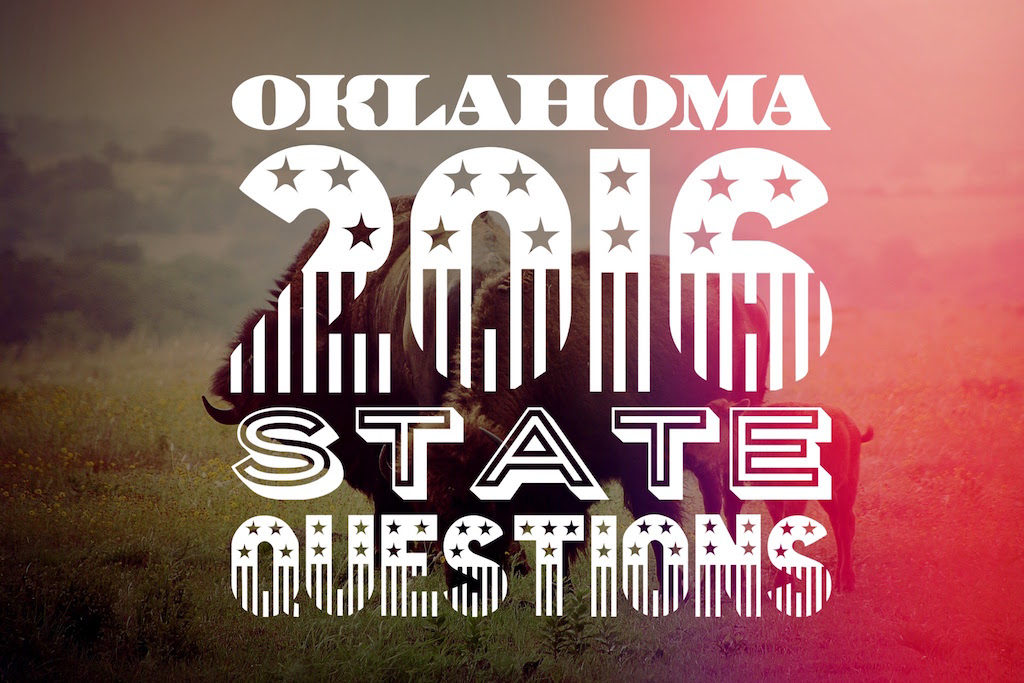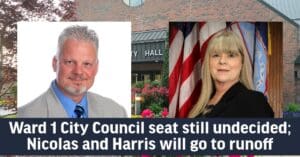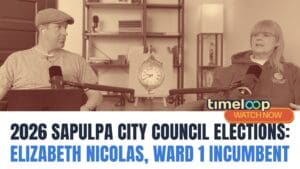Oklahoma is a state as red as the dirt you find here, so there’s very little question about who’s going to win the Presidential election in our state. For many more of us however, the more important issues on the ballots are the state questions that are coming up for voting on Tuesday. We’ve compiled the best list of all the available questions, as well as short news clips on each (some clips cover more than one question) in order to keep you more informed.
2016 State Questions
The Governor’s office has filed election proclamations for SQ776, SQ777, SQ 779, SQ 780, SQ 781, SQ 790 and SQ 792 to be placed on the November 8, 2016 General Election ballot. The ballot titles for those questions are provided below. Information on all State Questions can be found on the Secretary of State’s search page.
STATE QUESTION NO. 776
This measure adds a new section to the Oklahoma Constitution, Section 9A of Article 2. The new Section deals with the death penalty. The Section establishes State constitutional mandates relating to the death penalty and methods of execution. Under these constitutional requirements:
- The Legislature is expressly empowered to designate any method of execution not prohibited by the United States Constitution.
- Death sentences shall not be reduced because a method of execution is ruled to be invalid.
- When an execution method is declared invalid, the death penalty imposed shall remain in force until it can be carried out using any valid execution method, and
- The imposition of a death penalty under Oklahoma law—as distinguished from a method of execution—shall not be deemed to be or constitute the infliction of cruel or unusual punishment under Oklahoma’s Constitution, nor to contravene any provision of the Oklahoma Constitution.
More information on State Question No. 776
STATE QUESTION NO. 777
This measure adds Section 38 to Article II of the Oklahoma Constitution.
The new Section creates state constitutional rights. It creates the following guaranteed rights to engage in farming and ranching:
- The right to make use of agricultural technology
- The right to make use of livestock procedures, and
- The right to make use of ranching practices.
These constitutional rights receive extra protection under this measure that not all constitutional rights receive. This extra protection is a limit on lawmakers’ ability to interfere with the exercise of these rights. Under this extra protection, no law can interfere with these rights, unless the law is justified by a compelling state interest-a clearly identified state interest of the highest order. Additionally, the law must be necessary to serve that compelling state interest.
The measure—and the protections identified above—do not apply to and do not impact state laws related to:
- Trespass,
- Eminent domain,
- Dominance of mineral interests,
- Easements
- Right of way or other property rights, and
- Any state statutes and political subdivision ordinances enacted before December 31, 2014.
More information on State Question No. 777
Editor’s note: We’ve previously published information on State Question 777 here.
STATE QUESTION NO. 779
This measure adds a new Article to the Oklahoma Constitution. The article creates a limited purpose fund to increase funding for public education. It increases State sales and use taxes by one cent per dollar to provide revenue for the fund. The revenue to be used for public education shall be allocated: 69.50% for common school districts, 19.25% for the institutions under the authority of the Oklahoma State Regents for Higher Education, 3.25% for the Oklahoma Department of Career and Technology Education, and 8% for the State Department of Education. It requires teacher salary increases funded by this measure raise teacher salaries by at least $5,000 over the salaries paid in the year prior to adoption of this measure. It requires an annual audit of school districts’ use of monies. It prohibits school districts’ use of these funds for increasing superintendents’ salaries or adding superintendent positions. It requires that monies from the fund not supplant or replace other educational funding. If the Oklahoma Board of Equalization determines funding has been replaced, the Legislature may not make any appropriations until the amount of replaced funding is returned to the fund. The article takes effect on July 1 after its passage.
More information on State Question No. 779
STATE QUESTION NO. 780
This measure amends existing Oklahoma laws and would change the classification of certain drug possession and property crimes from felony to misdemeanor. It would make possession of a limited quantity of drugs a misdemeanor. The amendment also changes the classification of certain drug possession crimes which are currently considered felonies and cases where the defendant has a prior drug possession conviction. The proposed amendment would reclassify these drug possession cases as misdemeanors. The amendment would increase the threshold dollar amount used for determining whether certain property crimes are considered a felony or misdemeanor. Currently, the threshold is $500. The amendment would increase the amount to $1000. Property crimes covered by this change include; false declaration of a pawn ticket, embezzlement, larceny, grand larceny, theft, receiving or concealing stolen property, taking domesticated fish or game, fraud, forgery, counterfeiting, or issuing bogus checks. This measure would become effective July 1, 2017.
More information on State Question No. 780
STATE QUESTION NO. 781
This measure creates the County Community Safety Investment Fund, only if voters approve State Question 780, the Oklahoma Smart Justice Reform Act. This measure would create a fund, consisting of any calculated savings or averted costs that accrued to the State from the implementation of the Oklahoma Smart Justice Reform Act in reclassifying certain property crimes and drug possession as misdemeanors. The measure requires the Office of Management and Enterprise Services to use either actual data or its best estimate to determine how much money was saved on a yearly basis. The amount determined to be saved must be deposited into the Fund and distributed to counties in proportion to their population to provide community rehabilitative programs, such as mental health and substance abuse services. This measure will not become effective if State Question 780, the Oklahoma Smart Justice Reform Act, is not approved by the people. The measure will become effective on July 1 immediately following its passage.
More information on State Question No. 781
BALLOT TITLE FOR STATE QUESTION NO. 790
This measure would remove Article 2, Section 5 of the Oklahoma Constitution, which prohibits the government from using public money or property for the direct or indirect benefit of any religion or religious institution. Article 2, Section 5 has been interpreted by the Oklahoma courts as requiring the removal of a Ten Commandments monument from the grounds of the State Capitol. If this measure repealing Article 2, Section 5 is passed, the government would still be required to comply with the Establishment Clause of the United States Constitution, which is a similar constitutional provision that prevents the government from endorsing a religion or becoming overly involved with religion.
More information on State Question No. 790
BALLOT TITLE FOR STATE QUESTION NO. 792
This measure repeals Article 28 of the Oklahoma Constitution and restructures the laws governing alcoholic beverages through a new Article 28A and other laws the Legislature will create if the measure passes. The new Article 28A provides that with exceptions, a person or company can have an ownership interest in only one area of the alcoholic beverage business-manufacturing, wholesaling, or retailing. Some restrictions apply to the sales of manufacturers, brewers, winemakers, and wholesalers. Subject to limitations, the Legislature may authorize direct shipments to consumers of wine. Retail locations like grocery stores may sell wine and beer. Liquor stores may sell products other than alcoholic beverages in limited amounts. The Legislature must create licenses for retail locations, liquor stores, and places serving alcoholic beverages and may create other licenses. Certain licensees must meet residency requirements. Felons cannot be licensees. The Legislature must designate days and hours when alcoholic beverages may be sold and may impose taxes on sales. Municipalities may levy an occupation tax. If authorized, a state lodge may sell individual alcoholic beverages for on-premises consumption but no other state involvement in the alcoholic beverage business is allowed. With one exception, the measure will take effect October 1, 2018.
More information on State Question No. 792








